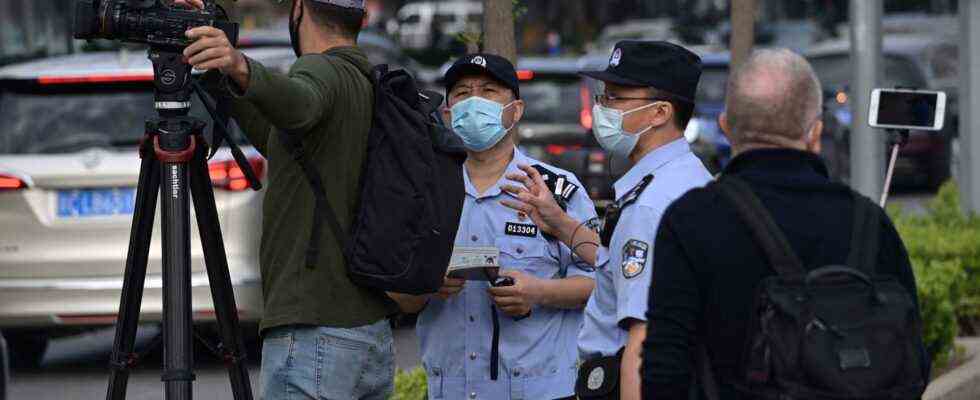Status: 03.11.2021 6:36 p.m.
Insults, threats, entry bans – three months before the Olympic Winter Games in Beijing, reporting is difficult for foreign media. The Foreign Press Club has now filed a complaint.
The arrival of the Olympic flame in Beijing two weeks ago. Few foreign journalists are present at the event. The reason: They simply didn’t know about the appointment, only found out about it at short notice or were not let in.
Not an exception, but the rule, says the Foreign Correspondents Club in China (FCCC). The press club asked its members about their experiences in preliminary reporting on the Olympics and published corresponding quotes. In order to rule out that journalists have to fear consequences from the Chinese side, the statements are anonymous.
No critical reporting
For example, a reporter for an international broadcaster complained: “We did a television report with material from a venue that we filmed during an organized press visit. In the report we mentioned calls to boycott the games for human rights violations.” Shortly afterwards, the organizer of the press conference called him and verbally abused him in English and Chinese, he said. “He threatened me that we would not receive any more invitations – since then we have not received any more access.”
In a letter of complaint to the International Olympic Committee (IOC) and the local organization team (BOCOC), the press club has now complained that foreign journalists have only very limited access to dates related to the upcoming Winter Games. This applies, for example, to press conferences and Olympic test runs or easy access to the venues and the Olympic villages.
Even entering the country is difficult
Contact with Chinese officials, athletes and coaches is almost impossible. Queries are often not answered at all and if so, then often negatively. According to the FCCC in China, foreign media workers have been intimidated several times by police officers and prevented from doing their work.
In addition to the difficulties in the country, it is currently not possible in most cases to fly in reinforcements from abroad. The background to this is that China only allows very few flights from abroad and hardly issues visas. This is justified with the extremely strict zero-covid policy of the People’s Republic.
A shielded bubble
In addition to the restrictions in the run-up to the Winter Olympics in China, the press club FCCC also complains that it is still unclear how exactly the reporting during the Games will be. It is clear that because of the strict Covid measures, the Winter Games in February will take place in a so-called bubble that is completely shielded from the rest of the country.
Journalists will also be part of it. It is still unclear whether it will be possible to leave the bladder and if so, under what circumstances. It is also still not known how foreign media workers come to the country and where they are housed.
Sport as propaganda
Critics accuse China’s leadership of using this practice to prevent negative reports about the country. The government is politicizing the Olympic Games, although they keep saying the opposite.
According to the Chinese civil rights activist and lawyer Teng Biao, who lives in exile in the US, sport is politicized, especially in authoritarian countries like China. China does not host the Olympic Games because the Communist Party is so fond of sport, but because it is a powerful propaganda tool. And the party used the games to gain political legitimacy.
Journalism completely in line
Very few journalists in China are surprised by the difficulties in reporting. There is no freedom of expression and freedom of the press in the People’s Republic. Chinese journalism is completely in line with state and party leadership. Foreign journalists have been hindered in their work for years.
In addition, China’s press restrictions are contrary to the Olympic Charter. This is also pointed out by the FCCC. According to Rule 48, all necessary measures must be taken to achieve “the most complete possible coverage by the various media and the largest possible audience worldwide.”
In an initial statement, the International Olympic Committee announced that it would take up the criticism and discuss the concerns with the national organizing committee.
Olympia 2022 in China: press club complains: restrictions for foreign press
Benjamin Eyssel, ARD Beijing, November 3rd, 2021 5:16 pm

